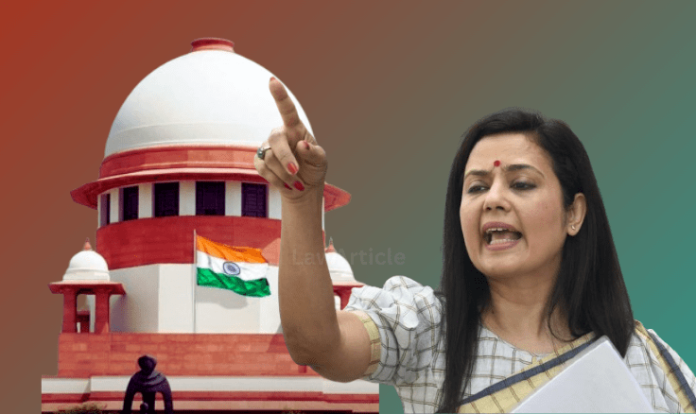Introduction
Case Title: Mahua Moitra v. State of Uttar Pradesh and Ors.
Trinamool Congress MP Mahua Moitra has filed a Public Interest Litigation (PIL) in the Supreme Court of India challenging the directives issued by the States of Uttar Pradesh and Uttarakhand. These directives mandate all proprietors of eating establishments along the route of the annual Kanwar Yatra to publicly display their names, addresses, and mobile numbers, along with the names of their staff.
The petition, filed through Advocate Shadan Farasat, contends that these actions exacerbate communal discord and threaten the livelihoods of affected individuals. The Supreme Court has agreed to hear the case. The PIL, filed by Trinamool Congress MP Mahua Moitra, challenges the directives from Uttar Pradesh and Uttarakhand requiring eatery owners along the Kanwar Yatra route to publicly display their names, addresses, and contact information.
Background
The Kanwar Yatra is an annual pilgrimage during the monsoon season, drawing millions of devotees of Lord Shiva. The yatra traverses through various cities, including Muzaffarnagar and Ghaziabad, and culminates in Delhi. On July 18, 2024, the Senior Superintendent of Police, Muzaffarnagar, issued a directive requiring all eateries along the Kanwar route to display the names of the owners. This directive was extended statewide on July 19, 2024.
Petition’s Contentions
The petition contends that these directives force food entrepreneurs to change their shop names to reflect the religious identity of the entrepreneur, thus exacerbating communal tensions. It argues that the directives are discriminatory, violate the right to privacy, freedom of occupation, and freedom of speech, and are arbitrary in nature.
Grounds for Challenge
- Article 15(1) Violation: The petition argues that the directives constitute pretextual discrimination on grounds of religion. By compelling the disclosure of personal details, the directives create an economic boycott of Muslim shop owners and workers. The petition states, “The upshot of this is to create a socially enforced economic boycott on Muslim shop-owners and workers, and the loss of their livelihoods.”
- Right to Privacy (Article 21): The petition claims that the directives violate the right to privacy, including informational privacy. The compelled disclosure of personal information lacks legislative authorization and exposes individuals to social persecution.
- Freedom of Occupation (Article 19(1)(g)): The petition asserts that the directives impose unreasonable restrictions on the business activities of eatery owners and food sellers, infringing upon their freedom to carry on any occupation, trade, or business.
- Freedom of Speech (Article 19(1)(a)): The petition claims that the directives amount to compelled speech, violating the right to freedom of speech and expression. The petition argues, “The State cannot outsource or abdicate its obligations by requiring citizens to give up their rights to free speech in order that public order is maintained.”
- Arbitrariness (Article 14): The petition argues that the directives are manifestly arbitrary, disproportionate, and lack any determining principle, thus violating the right to equality.
Previous Court Rulings and Incidents
The petition references the Supreme Court’s judgment in Tehseen Poonawalla v. Union of India [(2018) 9 SCC 501], which underscores the State’s obligation to prevent and punish hate crimes. It also highlights the Allahabad High Court’s stay on the statewide ban on meat selling in April 2017 in Saeed Ahmed v. State of Uttar Pradesh.
The petition alleges that since June 2023, anti-social elements have circulated doctored clips and fake news imputing that Muslim community members were polluting food served to pilgrims. It accuses the UP government of targeting Muslim-owned businesses, resulting in widespread economic boycotts and intimidation.
Conclusion
The PIL prays for the Supreme Court to quash the impugned directives and issue directions for stringent and effective enforcement of the Supreme Court’s judgment in Tehseen Poonawalla v. Union of India. The petition, drawn by Advocates Gautam Bhatia and Prannv Dhawan, emphasizes the need for judicial intervention to protect the fundamental rights of the affected individuals and ensure communal harmony.


